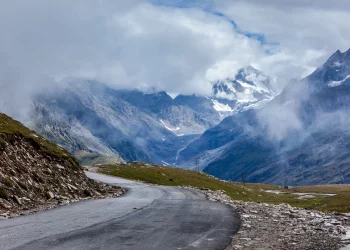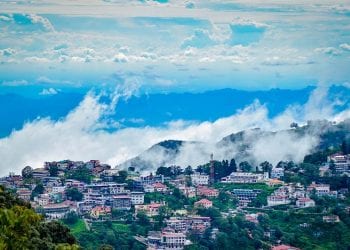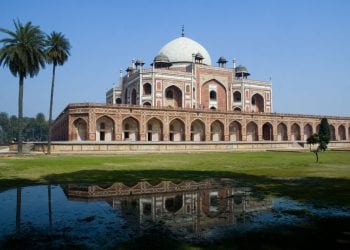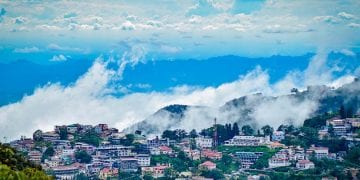Best Time to Visit Agra or Seasons of Love – Agra
Filled with stunning monuments that can render the world speechless, Agra is an Indian city located right beside the Yamuna River in Uttar Pradesh. Perhaps the most famous Agra tourist places are the Taj Mahal, and the Agra fort – unique architectural marvels attracting millions of tourists every year. Its tourist favoritism has placed Agra in the Golden Triangle tourist circuit of India and the Uttar Pradesh Heritage Arc Tourist Circle.
Agra’s rich history begins in the era of the Indian epic Mahabharata. At the time, Agra was referred to as Agrevana, a word that translates to “border of the forest”. Around the early 17th century, the city was under the rule of King Jaypal. It was later taken over by Mahmud of Ghazni who destroyed Agra and left it in ruins. During the Lodi dynasty, it was made the capital by Sultan Sikandar Lodi, restoring it to its previous glory. Since then and until the Indian independence, Agra remained an important political seat for rulers. Kings like Sher Shah Suri and Akbar ruled the city for decades before surrendering it to the British.
The Mughal period is widely considered to be a “golden period” for Agra. During this time, numerous small and big monuments and resources were established in the city. Emperor Akbar declared it an imperial top-level province and renovated existing monuments. It was a chief center for education, arts, politics, commerce, and trade. Later, Akbar constructed on the outskirts of Agra the iconic heritage city of Fatehpur Sikri. Emperor Jahangir planted several gardens in the premises of Agra’s Red Fort.
Agra’s beautiful monuments and gorgeous gardens give you plenty to do as a tourist. You may just wish to explore and photograph or go on an adventure amid its serene landscape – Agra will not disappoint you.
Best Time to Visit Agra

The dynamic Agra Weather will a big factor dictating your decision to explore some Agra tourist places. Since the city is located in the Ganga plains of India, its climate is largely sub-arid bordering on subtropical. You can witness extremes of some seasons and mild effects of others. Regardless of which season you prefer for traveling, you will find plenty of things to do in Agra.
Winter Season in Agra
Months: October to February
Average Maximum Temperature: 32 Degrees
Average Minimum Temperature: 18 Degrees
Undoubtedly, the best season to visit most Agra tourist places is winter. During these months, you will be able to enjoy the city without breaking a sweat. The maximum average temperature during this season is around 32 degrees, but in December and January, the minimum temperature can be as low as 2 degrees Celsius. You should carry at least a jacket to protect you from the cold weather if you happen to travel during these months. The weather is usually pleasant, which means all you need while walking around the city is a sunscreen and perhaps a hat. In the evenings, Agra’s pleasant weather coupled with the romantic vibe of the city will leave you mesmerized.
Some activities that you can enjoy during this season include
- Walking around the Taj Mahal
- Exploring the Agra Fort on foot
- Taking a bike tour of primary Agra tourist places
- Visiting the local markets
- Exploring Fatehpur Sikri – the sandstone city of Agra.
Exploring Agra in Winter

You can try some of the best things to do in Agra during winter. The foggy mornings warrant a chai at the local tea stall. If you happen to have breakfast at a rooftop restaurant overlooking the Taj Mahal or the Agra Fort, you will be in awe of the cottony fog covering Taj’s domes. During the day, walk or take a rickshaw to the Taj Mahal, making it a point to walk around the monument’s premises. If you want to delve deep into Mughal history, read the plaques and the wall inscriptions of stunningly symmetrical monuments. Take scenic pictures with the Taj in the periphery and its pond reflecting you. After you finish exploring this jewel of Muslim artistry, you can visit the Agra Fort. The pleasant Agra weather in winters will allow you to thoroughly explore this red architectural marvel. You can also rent a bicycle and take a tour of Agra’s vibrant streets as the cold wind welcomes you. Finish your evenings with a hot cup of chai or spicy dinner.
If you visit in February, one of the best things to do in Agra would be to experience the Taj Mahotsav. This 10-day fiesta is a colorful affair that will enchant your senses. Local artisans display their exquisite art and craft during this festival, making it a must-visit for everyone who is in the city. You will also see men and women dancing on the streets, handicraft and clothes being sold and delicious food served.
Monsoon Season in Agra
Months: June to September
Average Maximum Temperature: 36 degrees
Average Minimum Temperature: 24 degrees
While it is believed that visiting Agra between June and September can be difficult, monsoons make the city appear splendid. The temperatures are not very high. Monuments like the Taj Mahal and Jahangir Mahal are washed by the rains, making them appear pristine. If you do not mind a little rain while exploring these Agra tourist places, monsoon can provide you with a romantic vacation. The skies are cloudy, so you will not need sun-protection on most days. Never forget to carry an umbrella with you during this season.
Some of the best things to do in Agra during Monsoon include
- Going on a food tour of Agra
- Visiting the Jama Masjid
- Visiting the Mehtab Bagh
- Exploring Humayun’s Mosque
Exploring Agra in Monsoon
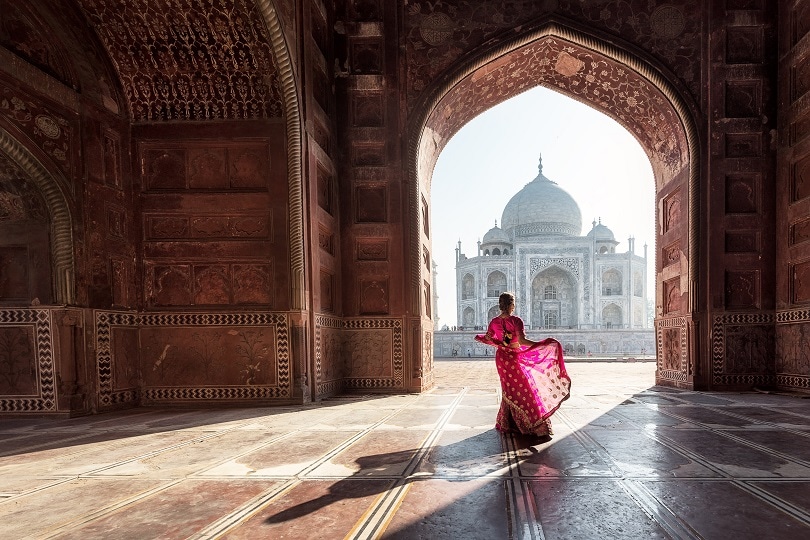
If you are a rain-lover and find special beauty in rain-drenched monuments, you will not regret visiting Agra during monsoon. There are certain problems associated with travel during this season, but once there, you will not run out of things to do in Agra. Agra’s rainy weather in the aforementioned months makes its exotic gardens bloom. The already lush green surroundings of the Agra Fort and the Jahangir Mahal are highlighted. The Mehtab Bagh blooms in full splendor with its green trees and colorful flowers. While at this perfectly quadrilateral garden, you will witness a picturesque view of the rain-drenched Taj Mahal. Since the skies are cloudy, the sun will not hamper your photography sessions amid this garden’s newly bloomed flowers. You can also immerse yourself in the divine by offering your prayers at the Jama Masjid. The symmetrical yet artistic interiors of the mosque will be the perfect spot to watch the rain cooling the ground if you visit on a rainy day.
A cloudy day with a pleasant breeze is also perfect for experiencing Agra’s hearty cuisine. Whether you try the local street food or the fine-dining prospects, you will be fulfilled and pleased.
In September, Agra celebrates one of the most important festivals of Northern India – the Ram Barat. This festival is a parade of celebrations. An 8km long walk through Agra’s neighborhoods, this procession sees the entire city dressed in fairy lights and festive decorations. The wedding procession of Lord Rama, chariots, locals dressed as characters from the Hindu epic Ramayana and amazing dance and music make the festival a sight for sore eyes. If you visit during monsoon, this festival will be the highlight of your Agra trip.
Summer Season in Agra
Months: March to May
Average Maximum Temperature: 45 degrees
Average Minimum Temperature: 25 degrees
While summer is not preferred by some people touring the Northern Plains, it is one of the most affordable seasons to visit Agra. The toughest of the summer months is May. Temperatures during the day can reach 45 degrees Celsius, so you must always carry an umbrella, sunscreen, sunglasses, and hats to protect yourself from the Sun. Even with sun-protection in place, drink water throughout the day to avoid dehydration.
Some of the best things to do in Agra during summers are
- Visiting the Dolphin Water Park
- Chilling at the Friends Gokulam Fun City Water Park
- Shopping at the Kinari Bazaar
- Boating in River Yamuna
Exploring Agra in Summers
Summer sees very few tourists in the city, warranting low hotel prices and many offers. The cost of traveling within the city is also low during summer. If you are on a tight budget, you can visit the Agra between March and June to avail of cost-efficient lodging and sight-seeing.
Summers are not the ideal time to explore Agra’s marble monuments. But you should not miss visiting Fatehpur Sikri and the Taj Mahal in the early hours of the morning. You can enjoy a calming boating tour in the Yamuna river while enjoying a magnificent view of the Taj. To cool yourself down, you can visit either the Dolphin Water Park or the Friends Gokulam Fun City Water Park. If you are visiting with kids, enjoying water rides and chilling in the pools will be the highlight of your trip. Since most water parks are closed in the winter months, summer might be the best time to explore them. Evenings are relatively cool and will allow you to enjoy a shopping trip to the Kinari Bazaar. You can also watch the Kalakriti Dance Drama show if you want to avoid enduring the hot weather on Agra’s streets. This drama will take you back to the interesting Mughal era and will leave your kids educated about India’s history.
Culinary Delights in Agra

Agra offers delicious vegetarian and non-vegetarian dishes. Mughlai and North Indian cuisine is favored by locals. You can try mouthwatering dishes like Petha, Gobhi ke Parathe, Lamb Kebabs, Bhalla, Dalmoth, Tandoori Chicken and Bedai. For fine dining, you can visit rooftop restaurants and bars located in upscale hotels and resorts.
Shopping in Agra
Agra’s lively markets invite huge tourist crowds. Visit local markets for shopping in Agra to buy leather goods, sweets, wooden and marble handicrafts, souvenirs, silk products, glassware, beaded jewelry, ornamental boxes, and rugs.
How to Reach Agra?
- For travel by train, board a train going to the Agra Cantt or the Agra Fort Railways stations.
- Agra is well connected to other major Indian cities by special roads and highways like the Taj Expressway. You can rent a car or take a bus to reach Agra via these routes.
- If you are traveling by air, the closest International Airports are the Delhi Airport and the Jaipur Airport. For domestic travel, board a flight heading to Delhi. Here is all about a weekend trip from Delhi to Agra.
Using Cameras and Mobile Phones

You can use cameras and mobile phones freely in most Agra tourist places. Museums and mausoleums might charge you extra for carrying a mobile or camera. Mosques and temples might prevent their usage completely.
No matter which season you visit, Agra will prove to be an unparalleled vacation. Agra’s immaculate gardens, perfectly symmetrical monuments, bustling streets, and welcoming vibe will give you the best possible heritage tour of India and will hold you hostage in this jewel of the Mughal Era.
Recent Posts
Top Picks
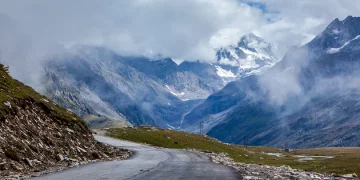
- OYO
 15 April, 2024
15 April, 2024 - Cultural Tour

- OYO
 15 April, 2024
15 April, 2024 - Cultural Tour

- OYO
 15 April, 2024
15 April, 2024 - Cultural Tour

- OYO
 15 April, 2024
15 April, 2024 - Cultural Tour

- OYO
 15 April, 2024
15 April, 2024 - Cultural Tour

Please rotate your device
Please go back to portrait mode for the best experience



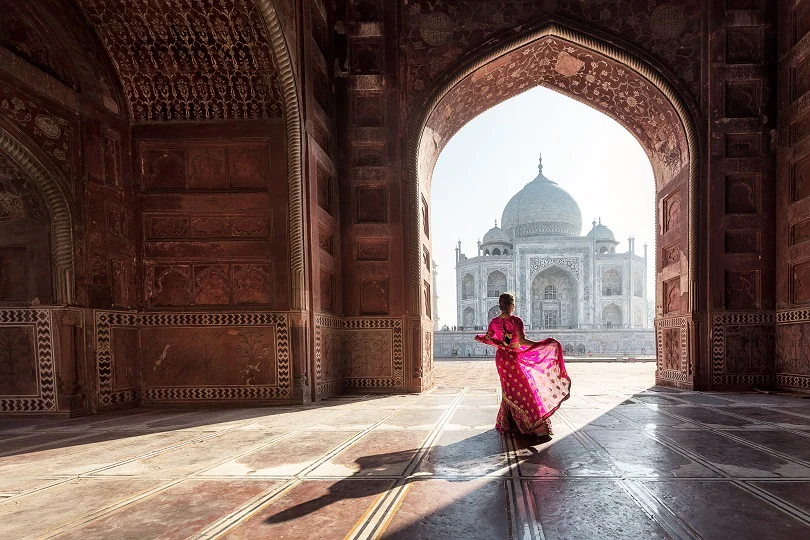

 April 15, 2024
April 15, 2024 